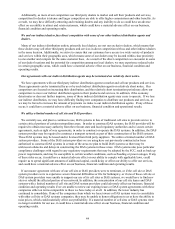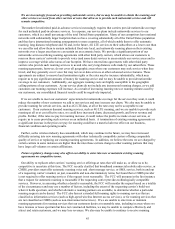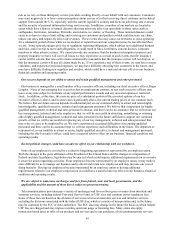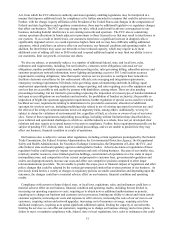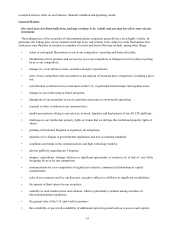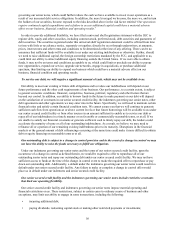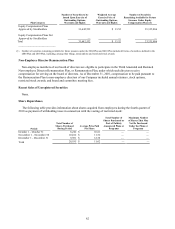Metro PCS 2010 Annual Report Download - page 64
Download and view the complete annual report
Please find page 64 of the 2010 Metro PCS annual report below. You can navigate through the pages in the report by either clicking on the pages listed below, or by using the keyword search tool below to find specific information within the annual report. 54
• availability of additional spectrum, whether by the announcement, commencement, bidding and closing of
auctions for new spectrum or acquisitions of other businesses;
• recruitment or departure of key personnel, management or board members; and
• failure to timely file periodic reports.
In addition, the stock market generally has experienced significant price and volume fluctuations, which may
continue for the foreseeable future. This volatility has had a significant impact on the trading price of securities
issued by many companies, including companies in the telecommunications industry. The trading price of our stock
has fallen significantly since our initial public offering. These changes frequently occur irrespective of the operating
performance of the affected companies. Hence, the trading price of our common stock could fluctuate based upon
factors that have little or nothing to do with our business, financial condition and operating results. The price
volatility and continued decrease in our stock price could subject us to takeover bids, actions by the NYSE and
possible losses for stockholders.
Your ownership interest could be diluted by future issuances of shares that our Board has the authority to
issue, and such future issuances or sales of such shares may adversely affect the market price of MetroPCS’
common stock.
We have registered all shares of common stock that we may issue under our equity incentive compensation plans;
thus, when we issue shares under these plans, the shares generally can be freely sold in the public market subject to
any requirements under the Securities Act. We also have granted certain of our stockholders the right to require us
to register their shares of our common stock. Our Articles of Incorporation currently allows us to have up to one
billion shares of common stock outstanding which is substantially more than currently outstanding. We also have
filed a shelf registration statement with the SEC, which allows us to issue registered debt, equity and other
securities, including common stock, preferred stock, debt securities and guarantees of debt securities, in addition to
the amounts already outstanding. The securities registered under this universal shelf registration statement could be
offered from time to time with little or no advance notice, separately or together, directly by us or through
underwriters, at amounts, prices, interest rates and other terms and conditions to be determined at the time of any
offering. If we register, or propose to register, any additional securities under the Securities Act, either for our own
account or for the account of security holders exercising registration rights, the number of shares subject to
registration could increase and your interest could be significantly diluted and the sale of these shares may have a
negative impact on the market price for our common stock. Further, the sale of a substantial amount of our common
stock, or the possibility of such a sale, including sales by significant stockholders or executives of the Company,
may reduce the market price of our common stock and could impede our ability to raise future capital through the
issuance of equity securities at a time and at a price we deem appropriate.
If we fail to manage our planned growth effectively and maintain an effective system of internal controls, we
may not be able to accurately report our financial results or prevent fraud.
We have experienced rapid growth and development in a relatively short period of time and expect to continue to
experience growth in the future. Effective internal controls are necessary for us to provide reliable financial reports
and effectively prevent fraud and to comply with Section 404 of the Sarbanes-Oxley Act of 2002, as amended, and
the rules and regulations of the SEC, collectively referred to as SOX. SOX requires us to furnish a report of
management’s assessment of the design and effectiveness of our internal control over financial reporting as part of
our Annual Report on Form 10-K filed with the SEC, and our management also is required to report on the
effectiveness of our disclosure controls and procedures. We regularly evaluate our internal controls, and our
independent auditors annually attest to our internal controls over financial reporting in compliance with SOX.
Material weaknesses could result in inaccurate financial statements or other disclosures or failure to prevent fraud.
Projections of any evaluation of effectiveness to future periods are subject to the risk that controls may become
inadequate because of changes in conditions or that the degree of compliance with the policies and procedures may
deteriorate. If we fail to maintain the adequacy of our internal controls, or to successfully remediate any material
weaknesses in a timely manner, we may not comply with SOX and our independent auditors would be unable to
certify as to the effectiveness of our internal controls over financial reporting and our stock price could fall and we
could be subject to investigations or sanctions by regulatory authorities or delisting from the NYSE. Further, any
material weakness or failure of our internal controls, or the effectiveness of our internal controls, could result in a
restatement of our financial statements which could also lead to a decline in our stock price. Inadequate internal
controls also could harm our reputation, cause us to lose customers, or cause investors to lose confidence in our
reported financial information, which could have a negative effect on the trading price of our stock, all of which


